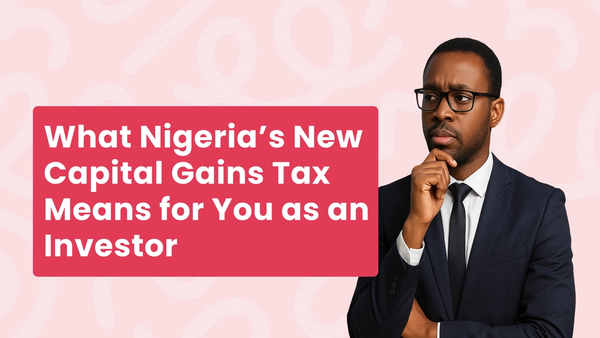When most people start investing, they often go all in on one “sure bet”, a trending stock, a high-interest opportunity, or a friend’s hot tip. But seasoned investors know better. True wealth-building isn’t about chasing the hottest investment. It’s about managing risk and securing steady, long-term growth.
That’s where diversification comes in.
Think of it like farming, if you plant only maize and a pest wipes out your crop, you lose everything. But if you also planted cassava, vegetables, and fruits elsewhere, you still have food (and income) coming in. That’s how diversification works for your money.
The lesson is simple: Don’t put all your eggs in one basket. That’s where diversification comes in.
What Is Diversification?
Diversification is the practice of spreading your investments across multiple assets, sectors, and markets to reduce risk and protect your money. Instead of betting everything on a single stock or sector, you’re allocating funds across different opportunities, so that if one investment performs poorly, others can help cushion the blow.
Why Diversification Is Important
1. It Reduces Your Risk
When your entire portfolio depends on one asset class — like stocks or crypto — you’re at the mercy of that market’s performance. A single bad quarter could wipe out your gains. Diversification spreads that risk so one poor performer doesn’t crash your entire portfolio.
2. It Balances Your Returns
Different investments thrive under different economic conditions. While stock markets might struggle, fixed income or money market funds might remain stable. Diversifying means you’re never putting your future in the hands of just one market trend.
3. It Helps You Handle Market Volatility
Markets go up and down. But when you hold a mix of investments — like stocks, bonds, mutual funds, and ETFs — you’re more likely to ride out the storms without panicking or making impulsive decisions.
4. It Keeps You Ready for Opportunities
When you’re diversified, you’re better positioned to take advantage of new trends. Whether it’s a growing sector, a strong-performing region, or a shift in currency values, you’ve already got a foot in the door.
5. It Builds Long-Term Stability
If your financial goals include things like retirement, paying for a child’s education, or buying a home, then you need a portfolio that can stand the test of time. Diversification gives you that foundation.
How to Diversify Like a Smart Investor
1. Use Multiple Asset Classes
Don’t just invest in one asset. Consider:
· Money Market Funds for capital preservation and emergency savings
· Mutual Funds for professionally managed portfolios and exposure to multiple assets with a single investment.
· Bonds for stable income
· Stocks for long-term growth
· Real estate if you’re able to commit for the long haul
· Dollar-based investments to protect yourself against naira volatility
2. Diversify Within Each Asset Class
Even if you only invest in stocks, diversify across industries like banking, telecoms, consumer goods, and energy. Also, mix large and small companies, and even consider regional exposure outside Nigeria, if possible. Some platforms offer global exposure through ETFs and foreign mutual funds.
3. Rebalance Regularly
As the value of your asset changes, your portfolio may lean too heavily in one direction. Set a time (every 6 months or yearly) to review and adjust, so your investments stay aligned with your financial goals and risk tolerance.
Set a schedule, quarterly or twice a year, to review and adjust.
What Happens When You Don’t Diversify?
Let’s say you put all your money in a stock like Presco. It’s been doing well, so you feel confident. Then, a market correction hits, or production prices tank. Your entire portfolio could suffer badly. But if you had also invested in ETFs, mutual funds, and another sector like consumer goods or banking, you’d have a safety net. That’s the whole point.
Final Thoughts
Diversification isn’t about avoiding risk altogether; it’s about managing it. No one knows which asset will be the best performer every year, but spreading your bets increases your chances of winning in the long run.




